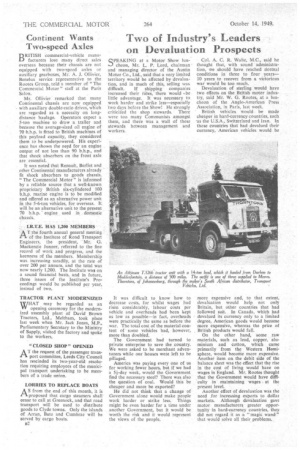Two of Industry's Leaders on Devaluation Prospects
Page 36

If you've noticed an error in this article please click here to report it so we can fix it.
QPEAKING at a Motor Show tun6-7 cheon, Mr. L. P. Lord, chairman and managing director of the Austin Motor Co., Ltd., said that a very limited territory would be affected by devaluation, and in much of this, selling was difficult. if shipping companies increased their rates, there would be little advantage. It was necessary to work harder and strike less—especially two days before the Show! He strongly eriticiied the shop stewards. There were too many Communists amongst them, and there was a wall of these stewards between management and worke rs.
It was difficult to know how to decrease costs, for whilst wages had risen considerably, labour costs per vehicle and overheads had been kept as low as possible—in fact, overheads were practically the same as before the war. The total cost of the material content of• some vehicles had, however, more than doubled.
The Government had turned to private enterprise to save the country. We were asked to be merchant adventurers while our houses were left to be America was paying every one of us for working fewer hours, but if we had 51--day week, would the Government find the necessary steel? There was also the question of coal. Would this be cheaper and more be exported?
He did not think that a change of Government alone would make people work harder or strike less. Things might be even harder for a time under another Government, but it would be worth the risk and it would represent the views of the people.
Col. A. C. R. Waite, MC., said he thought that, with sound administration, we should have reached normal conditions in three to four years10 years to recover from a victorious war would be toomuch.
Devaluation of sterling would have two effects on the British motor industry, said Mr. W. G. Rootes, at a luncheon of the. Anglo-American Press Association, in Paris, last week.
British vehicles would. be made cheaper in hard-currency countries, such .as the U.S.A., Switzerland and Iran. In those countries that had devalued their currency, American vehicles would be
more expensive and, to that extent, devaluation would help not only Britain, but other countries that had followed suit. In Canada, which had devalued its currency only to a limited degree, American goods would become more expensive, whereas the price of British products would fall.
On the other hand, some raw materials, such as lead, copper, alum minium and cotton, which came primarily from the Western • Hemisphere, would become more expensive. Another item on the debit side of the balance sheet was the effect that the rise in the cost of living would have on wages in England. Mr. Rootes thought that the Government would have difficulty in maintaining wages at the present level.
Another effect of devaluation was the need for increasing exports to dollar markets. Although devaluation gave motor manufacturers greater opportunity in hard-currency countries, they did not regard it as a "magic wand" that would solve all their problems.




























































































